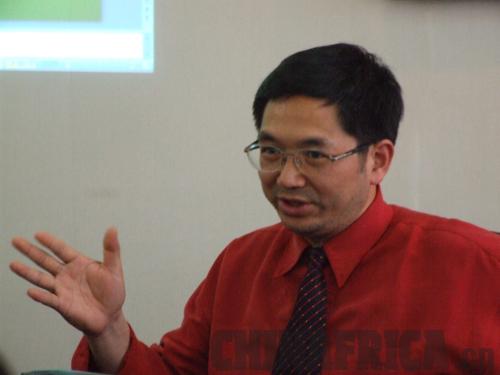| 
In 2009, Yu Youbin, a professor at the School of Humanities and Social Sciences at Beijing Institute of Technology, became the Chinese co-director of the Confucius Institute located within the University of Lagos. This new position gave him a new perspective beyond the walls of academia. Yu shares his story with ChinAfrica.
How did you become the co-director of the Confucius Institute at the University of Lagos?
When I first heard about the Confucius Institute in 2004, I believed it was a good concept. In May 2009, the cooperative program between my school in Beijing and the University of Lagos was launched. After I applied for the director position, I took a training course with other applicants and teachers. When we finished, everyone had to pass a final exam. The requirements are quite strict and include a written exam, interview and psychological test, as well as a team project. The strict criterion is a sign that the China National Office for Teaching Chinese as Foreign Language (Hanban) is very determined in its efforts to find qualified staff for the Confucius institutes. And it's a position well worth the effort.
What impressed you most during your time in Nigeria?
African people have a relaxed attitude about life. From a Chinese perspective, it might seem at first like they lack a tendency to plan, because Chinese people emphasize planning and rationality. But I think our history and culture has endowed us with a rigid sense of mission, sometimes it's a burden. We can learn a lot from African culture. African people prefer to work in an impromptu way. They are good at improvisation, and even their most creative art forms are based on nature and real life. Chinese thinkers and artists should learn from that.
What differences exist in educational concepts between China and Africa?
In Nigeria, you can see how people value family and kinship. Chinese are the same. But Chinese education attaches great importance to mission, responsibilities, ambition and morality. In Nigeria, education is not necessarily closely tied to these concepts. African education especially emphasizes the dynamics of human behavior. I think Africa is a place we would say is "nearest to heaven." Concepts and values on the continent are closely tied to human nature because it was, historically, least affected by industrial civilization.
Do you think language is indispensable to cultural exchange?
When people from two countries want to communicate, language is the first barrier they meet. Proficiency in other languages can minimize the possibility of misunderstanding and further promote friendship and cooperation between people of different nationalities. Therefore, language is a platform in cultural exchange, and a good platform can lead to effective communication. Many people know a lot about Western countries because they know English, and then can have face-to-face communication with Westerners. Without this direct communication, we can only learn about others through the media. In those cases, the effect will be quite different.
What did you gain from your experience in Lagos?
Being a co-director of a Confucius Institute is very different from teaching in a Chinese university. As a professor, you may meet all kinds of students who raise all sorts of questions, but generally speaking they are similar. Cultural exchange is a totally different thing. A new culture brings you into a new world. People share the same stars and moon, but their viewpoints about them, about themselves, about others and society are different. As the organizer of a cultural exchange program, I find it so amazingly challenging and interesting. It's quite a draw for me to confront a cross-culture lifestyle. Whenever I arrive at an overseas Confucius Institute, I can find something that doesn't exist in my background at all. And I'm able to introduce the Chinese lifestyle to Africans – how Chinese think and view the world, how we view our nation and family, how we think of different cultures. |